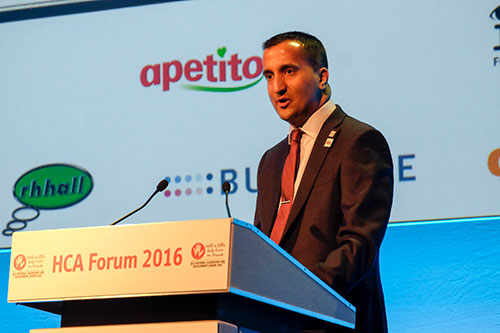Public sector focus: The challenges school caterers still face
The outgoing chair for the Lead Association for Catering in Education, Peter McGrath, talks to Katey Pigden about the school meal legacy and how there's more for LACA still to learn
How did you first become involved with the Lead Association for Catering in Education (LACA) and what appealed to you about it?
I first became aware of LACA in the mid-90s, while I was working with Derbyshire County Council's catering services. During that time local authorities were going through significant change and I felt that learning and sharing ideas with colleagues experiencing the same thing could only be of benefit.
The strength of LACA is the network, the vast experience of its members and the way they connect and care about the services we provide to the thousands of pupils and students each day. I have represented the LACA Yorkshire & Humberside region on the LACA national board for a number of years now, and I became national chair in September 2015.
Tell us about your day job. How have you balanced it with your role as LACA chair?
My current role as strategic lead for primary contracts for Taylor Shaw, part of Elior UK, is diverse, challenging and rewarding. I have previously worked in hospitality, the private sector and public sector, and the experience has proved invaluable to growing my team.
I support contracts and managers to deliver an ever-improving service to the children in schools across north London and offer advice on planning, policy, innovation and operational issues. Taking on the responsibility of leading a national organisation requires dedication and flexibility and an understanding of the amount of commitment it takes to do it well. I have been fortunate that all Taylor Shaw directors have been understanding and supportive of my involvement with LACA. Without their backing I am sure I would not have delivered my objectives as LACA chair.
Peter McGrath with Sharon Hodgson MP
You're passionate about the health of children and the important job of feeding them well. What was your reaction to the Childhood Obesity Strategy? Do you think it's enough?
I have listened to experts and read media reports from professionals and clearly their view is that the strategy could have gone further and is a missed opportunity. There are positive actions within the strategy - especially those that link to education and schools - but I am waiting to see more detail from the plan. I welcome any intervention that assists the improvement of a child's health, especially related to food and exercise, and we must collectively work together to make improvements.
Were you surprised by the recent research on how unhealthy packed lunches are?
No, in fact I recall similar research when I worked for the School Food Trust over five years ago, which had a similar outcome. If they are given the healthy option early, children are more likely to choose it. It is encouraging to see within the obesity strategy that schools are seen as pivotal to improving this. This is supported by the report by the health select committee, Childhood Obesity - Brave and Bold Action, which stated that clear nutritional guidelines should be published setting out the standards for packed lunches as well as food supplied by schools. I think there is a long journey ahead of us on packed lunches.
What do you think the future holds for Universal Infant Free School Meals [UIFSM]?
There has been significant investment from the government, schools and providers to ensure UIFSM was, and continues to be, successful. Thousands of children and families have benefited from the policy. Prior to the comprehensive spending review last autumn, there was concern UIFSM could be at risk.
But there was clear support from a range of sectors, including health, education, industry and the general public that it should remain. UIFSM and initiatives such as the free fruit in school scheme contributes to a child's healthy early start in life. It is inclusive and contributes not only to a balanced diet but to social learning. When a child has been well fed and is not hungry, they are more likely to be ready to learn. I believe it's one of the most positive interventions since the introduction of school meals in the 1940s.
What are some of the main challenges facing school caterers today?
School food has changed dramatically over the past 25 years and will continue to do so. New legislation including school food standards and allergens has been met. Devolved funding and a competitive marketplace have seen the growth in private sector providers and will continue to be successful. But these days it is more than just providing a meal - it's about adding value and exceeding expectations; it's about engagement with school leadership and the wider school community. Recruitment and the retention of our staff and investment in the teams that deliver our services is key.
The National Living Wage is positive for the lower waged, but when aligned to school budget constraints, it will no doubt place pressure on caterers to make any return to reinvest. There will be a need to introduce incentives to improve take-up and mitigate costs.
The lunch break is a valuable time for students and, as schools grow in size, there is a pressure to feed children well and give them a good lunchtime experience, especially if the lunch time as well as the dining space is reduced. Caterers will need to work closely with school leadership teams to maximise the benefit and ensure that they all understand the value of this lunchtime experience.
The impact of Brexit may well see an increase of food cost due to the fluctuation of exchange rates and caterers need to be mindful that costs could increase above inflation over the next 12 months.
There will also always be the challenge of competition from the high street, fast food outlets and burger vans that lie beyond the school gates. That is where licencing and local council leadership can help.
Neel Radia, NACC national chair
Do you think the public's opinion of school dinners has changed much in recent years?
I do. There has been much publicity surrounding school food and in the main the media has had a balanced view, which has given the public more information about the benefits of school food. Celebrity chefs have raised the profile and have been instrumental in effecting change against the need for investment.
Speaking with staff and parents it is clear that many have seen positive change and an improvement in standards, such as the Red Tractor products along with quality of presentation and choice. This is further underpinned by an improvement in take-up and an increase of professional staff, that would have normally chosen hospitality, entering the school kitchen.
You recently completed a 100km run to raise funds for the Filling the Holiday Gap project. Tell us about it.
For my LACA chair challenge I decided to run 10 10km distances - one in each of the LACA regions. Following my trips to the US, I became aware of the national summer meals programme. The government there has been funding lunch over the school holidays for over 25 years. It's not just about children receiving good nutrition during the summer break, it's about social isolation, poverty, financial pressure on families and kids just having somewhere to go and something to do that makes a positive memory.
My aim was to raise funds to support at least one project in England, Scotland, Northern Ireland and Wales. We received 24 bids by the closing date to the value of over £41,000, which goes someway to show the level of need across the country. I wish I could have supported them all. We managed to raise over £5,000 and with the support of Kath Breckon, School Chef of the Year 2016, I identified 11 projects that would receive match-funded support and allocated all funds available.
Kath Breckon, School Chef of the Year 2016
What are some of the standout moments from your time as LACA chair?
There have been many - naturally, the 100k run was a personal high, given that over a year ago I couldn't run a bath! The launch of National School Meals Week at the Welsh Assembly, Senedd in Cardiff, was especially brilliant, and meeting Carwyn Jones AM [first minister of Wales], who gave his time to support us.
Another standout moment was the LACA Main Event in July, where we raised more than £12,000 to support two chosen charities - Roundabout and Harvest Gardens.
But without doubt, my proudest moment was the way everyone came together to make the case for the retention of UIFSM. It was an honour to lead the group. It showed that we are all connected with a shared purpose and that it's the right thing to do.
There seems to be greater collaboration now with other catering associations such as the Hospital Caterers Association (HCA) and the National Association of Care Catering (NACC). How important is that?
Understanding the need of the individual is a common thread through all our services. We share similar challenges brought about by the need to have improved outcomes for our customers against a backdrop of austerity.
Public services are constantly in the spotlight and the need to provide excellent value will always be a priority. The NACC does amazing work, led by Neel Radia. The work that many do in care, day in day out, should not be undervalued by our society.
I also have great admiration for the HCA, led by Phil Shelley. Its approach to improving food for patients through the Power of 3 campaign is a great strategy that is bearing fruit through connecting the patient, the ward staff and the caterer. I'm positive the collaboration between the associations will continue.
What advice would you give to Sally Shadrack, who will be taking over the role of LACA chair?
I am not sure she needs it. She has experience and knowledge second to none, has great leadership qualities and is focused and determined. All I would say is enjoy the ride as it is a bit of a rollercoaster: it has up and downs, it can be fun, and it's difficult to get off once it's started.
Peter McGrath
Continue reading
You need to be a premium member to view this. Subscribe from just 99p per week.
Already subscribed? Log In














